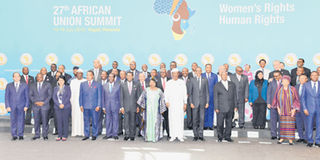Africa now needs strong think tanks to enhance soft power

African Heads of State before the official opening of the 27th African Union Summit in Kigali, Rwanda on July 17, 2016. PHOTO | FILE
What you need to know:
- Thinks tanks are increasingly becoming what one author rightly called “masters of the universe”. In geopolitical terms, policy institutes are indicators of soft power capacity of nations.
- The indispensable role of think tanks in international relations was the focus of a seminar on “Investing in soft power capacity: China-Africa think tank cooperation” jointly convened by the Africa Policy Institute (API) and the Chinese Academy of Social Sciences (CASS) in Nairobi on March 10, 2017.
In today’s increasingly uncertain world, powerful nations are more likely to use think tanks than military tanks to crush their enemies and shape policy. Thinks tanks are increasingly becoming what one author rightly called “masters of the universe”. In geopolitical terms, policy institutes are indicators of soft power capacity of nations.
The indispensable role of think tanks in international relations was the focus of a seminar on “Investing in soft power capacity: China-Africa think tank cooperation” jointly convened by the Africa Policy Institute (API) and the Chinese Academy of Social Sciences (CASS) in Nairobi on March 10, 2017.
To be sure, the influence of think tanks in Africa is not new. Ghana’s first President, Dr. Kwame Nkrumah, set up think tanks to shape policy on the direction of African unity and the liberation struggle in the 1960s.
His Bureau of African Affairs (BAA) had the Africa’s best minds such as George Padmore, W.E.B Dubois, Kenya’s Mbiyu Koinange and Joseph Murumbi. In the post-Cold War era, African academics have set up policy research centers, which have influenced public policy.
While Makau W. Mutua’s talismanic “real professor” in an acerbic altercation last year (April 2016) may still be the embodiment of knowledge, the business of thinking in the world today has fundamentally shifted to a new generation of think tanks.
Power, too, is pivoting towards think tanks, whose number worldwide has risen from 5,465 in 2009 to 6,846 by 2016. In America, together with media and Congress, think tanks are the prime movers of power in Washington, DC.
In Africa, the greater part of the business of knowledge production to inform policy by governments and corporates is carried out, not in universities but in policy research institutes focusing on critical topics from social policy to political strategy, economics to military, technology to culture.
There are three major reasons why Africa needs to consciously raise its think tank capacity.
First, in our multipolar world, think tanks are instruments through which states are increasingly asserting their interests in international affairs and critical indicators of the capacity of countries to project their soft power—defined by the American scholar Joseph S. Nye as “the ability to produce outcomes through persuasion and attraction rather than coercion of payment”.
Correspondingly, the top ten countries with the largest number of think tanks are also the most influential players in the global arena or topmost powerhouses in the global South. The US has the lion’s share of these thank tanks 1,835, with over 400 of them in Washington, DC alone.
China, the world’s second most powerful nation, holds the second place with 435 think tanks, followed by the United Kingdom (288), India (280), Germany (195), France (180), Argentina (138), Russia (122) and Canada (99).
Because of its historically feeble think tank capacity, Africa has lost almost all the battles of ideas. Colonialism was one such battle. Besides its battleground losses, Africa was crushed by the think tanks of colonial powers.
As one of the most enduring legacies of this era, Western think tanks and experts continue to dominate the business of policy thinking in Africa.
While universities have to de-colonize Africa’s mind—to borrow Professor Ngugi wa Thiongo’s’ title—African think tanks have an extra-ordinary task to decolonise the policy space where decisions affecting Africa are negotiated and made.
Prof Peter Kagwanja is chief executive, Africa Policy Institute


